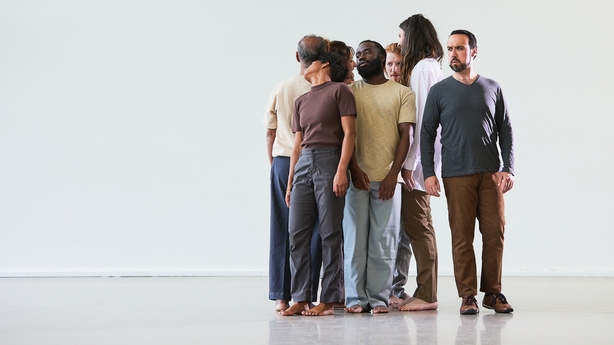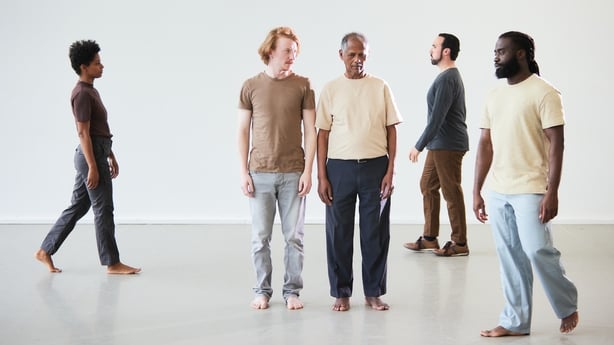Acclaimed poet Jessica Traynor introduces her latest project, penning the libretto for The Wanderer, a new contemporary dance opera for Irish Modern Dance Theatre, which premieres at this year's Cork Midsummer Festival.
Writing poetry is a solitary activity, so it’s always wonderful to be invited to be part of bigger projects, especially multidisciplinary ones. When asked by John Scott of Irish Modern Dance Theatre to write ‘a contemporary dance opera’ to be composed by Tom Lane, my synapses really started firing.
We need your consent to load this rte-player contentWe use rte-player to manage extra content that can set cookies on your device and collect data about your activity. Please review their details and accept them to load the content.Manage Preferences
Listen: Jessica Traynor talks The Wanderer to RTÉ Arena
Knowing that John’s work is concerned with the movement of people from one place to the next, experiences of exile, and building of new communities, the theme proposed – migration – felt really apt. Especially since I’d just recently finished working on Correspondences, the anthology I edited with Stephen Rea to call for an end to direct provision. One of the ideas that had come to preoccupy me during the time working with people who had experienced direct provision, was that ‘the migrant crisis’ was such a dangerous term. It created a sense of exceptionalism for the current moment; as if movement, migration, exile and wandering aren’t innate parts of human experience.

so it's always wonderful to be invited to be part of bigger projects.'
And so, when approaching this libretto, I began to think about the history of wandering and migration in literature. Poetry is at its best when approaching big ideas through precise and focused language, so I began by identifying the different approaches to movement and migration this dance opera might take, trying to whittle these down into a number of thematic movements which reflect the more literal theme of wandering.
Firstly, I began to think of how wandering is portrayed in world literature; the tropes and archetypes that crop up. In particular, Ahaseurus, or ‘the wandering Jew’, a figure that’s haunted European literature for centuries, struck me. Here, we have the wanderer as uncanny – cursed to wander, rather than moving by choice. A movement in the opera, written in response to this figure, asks the simple but loaded question: ‘Who wanders in the night?’

We also have literature which recognises and laments the plight of the exile, such as the 10th century Anglo-Saxon poem The Wanderer, from which our opera takes its name. This poem captures the strangeness of experiencing new worlds, alone, and far from home: ‘walking the whale’s acre’.
I’ve been an emigrant twice in my life; both times for economic reasons. I have not experienced the hardship that so many have faced. But I have experienced the dangers of being a woman moving through the world, sometimes sharply. Rebecca Solnit’s Wanderlust inspired me to channel some of my own experiences of traveling, alone, after dark. In it, she notes: "…the English language is rife with words and phrases that sexualize women’s walking. Among the terms for prostitutes are streetwalkers, women of the streets, women on the town, and public women (and of course phrases such as a public man, man about town, or man of the streets mean very different things than do their equivalents attached to women)."

I particularly wanted to ensure that the opera featured the words of our dancers themselves; a collection of brave and generous people from all over the globe, who now make their lives and art in Ireland. We spent a workshop working together where we discussed movement, and what it meant to them as individuals. The dancers swapped stories of movement’s liberations, and its sorrows, and we discussed what language each individual danced in.
At the end of the session I collaged their words and reminiscences into a movement which aims to capture the threads of emotion that bind together multifaceted experience. The group’s concluding words, put together from testimony by Salma Ataya, Magdalena Hylak, Immaculate Kirby, Nina, Favour Odosola, and Haile Takabo, will stay with me for a long time:
‘You can walk all over the world,
but when your times comes to die,
you will come home.
We are alive together.’
I hope that audience members coming to see The Wanderer will experience the sadness, liberation, passion and drive that keeps the human race moving across the surface of our planet. And I hope they will leave with a changed notion of why and how we move.
The Wanderer, an Irish Modern Dance Theatre commission with libretto by Jessica Traynor and composed by Tom Lane, will premiere at Cork Midsummer Festival on World Refugee Day, 20th June 2022 - find out more here.

